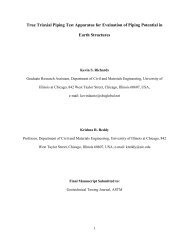Toward a Useful Theory of Mentoring: A Conceptual Analysis and ...
Toward a Useful Theory of Mentoring: A Conceptual Analysis and ...
Toward a Useful Theory of Mentoring: A Conceptual Analysis and ...
You also want an ePaper? Increase the reach of your titles
YUMPU automatically turns print PDFs into web optimized ePapers that Google loves.
close touch.<br />
Simple as it is, this thought experiment raises some fundamental questions about<br />
the nature <strong>of</strong> mentoring, questions not easily answered by consulting the mentoring<br />
literature. We explore these questions below. Many <strong>of</strong> these questions have implications<br />
not only for theory but also research design.<br />
Question: Is mentoring different when the mentor is the protégé’s boss?<br />
Some mentoring researchers focuses on “supervisory mentoring” questioning whether or<br />
not one’s boss can be a mentor <strong>and</strong> whether supervisory mentoring is preferred to nonsupervisory<br />
mentoring or vice versa (Burke, McKenna, & McKeen, 1991; Eby, 1997;<br />
Green & Bauer, 1995; Sc<strong>and</strong>ura & Schriesheim, 1994; Tepper, 1995; Tepper & Taylor,<br />
2003). Eby <strong>and</strong> colleagues (2000) investigated the conditions under which protégés are<br />
most likely to report negative mentoring experiences, such as abuse, neglect, intentional<br />
exclusion, tyranny, deception, incompetence, or sexual harassment <strong>and</strong> found that having<br />
a mentor who is one’s supervisor, as compared to non-supervisory mentor, is not related<br />
to reporting negative mentoring experiences. Burke <strong>and</strong> colleagues (1991) tested whether<br />
mentoring relationships are “special” compared to regular supervisor-subordinate<br />
relationships <strong>and</strong> found that there were no significant differences between mentored<br />
subordinates <strong>and</strong> other subordinates, except that those mentored reported higher levels <strong>of</strong><br />
psychosocial functions such as friendship.<br />
We suggest, in accordance with the literature, that one’s boss should be eligible<br />
under the concept “mentor” <strong>and</strong> that a boss can be an effective mentor. Indeed, saying<br />
that one’s boss cannot be a mentor results in an unrealistic delimitation. A “boss” is a<br />
particular type <strong>of</strong> administrative superior,” typically one who interacts more directly,<br />
<strong>of</strong>ten face-to-face. If we assume that mentoring requires at least some face-to-face<br />
10



